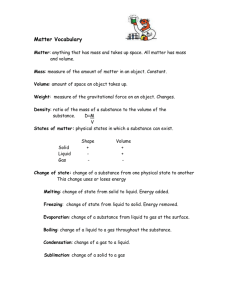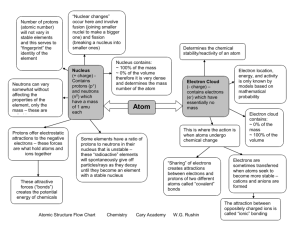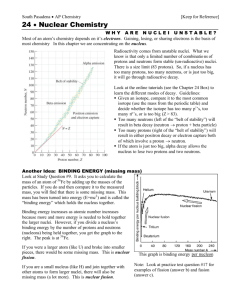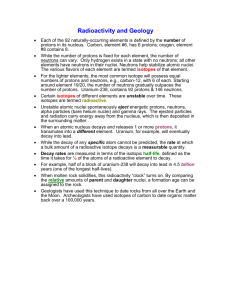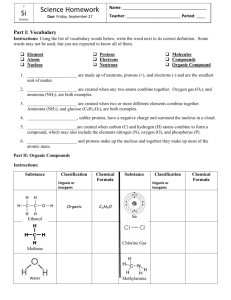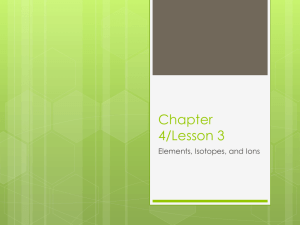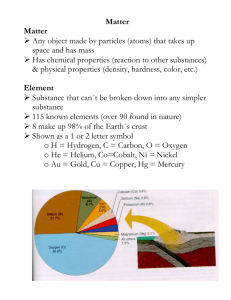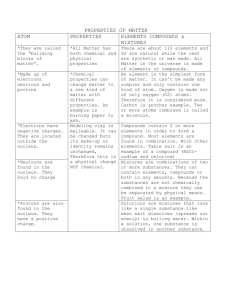Radiation
advertisement
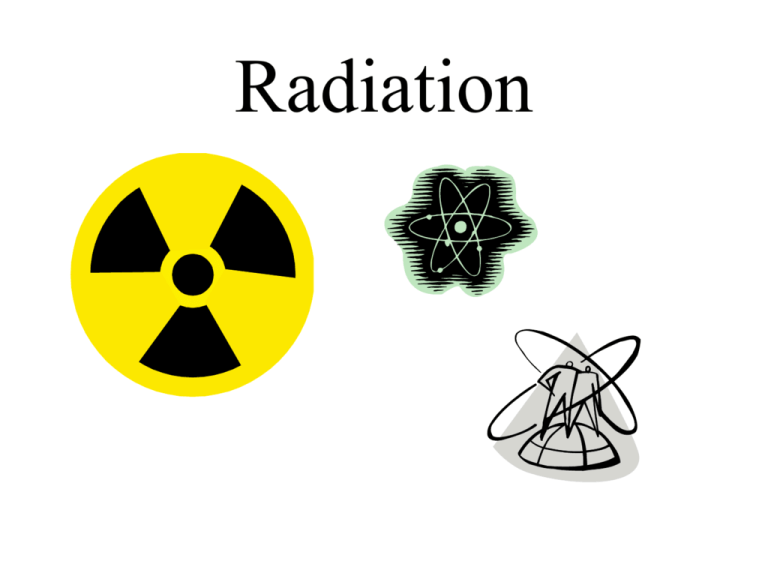
Radiation Atomic Anatomy • Atoms – electrons (e-) – protons (p+) – neutrons (n) Atoms are electrically neutral with no net charge. Ions are atoms that have been stripped of one or more of their electrons and have a net charge. Isotopes • Identical Chemical Properties, Different Atomic Weight • Difference = presence of # of neutrons in the nucleus Hydrogen = 1.0079 amu A ZX X = Element Symbol Z = Atomic Number (periodic table, # protons) A = Isotope Number (# neutrons) Isotope Designations Hydrogen 1 1 proton, 0 neutrons Helium-4 4 2 protons, 2 neutrons Uranium-235 235 U 92 1H 2He 92 protons, 143 neutrons Radioactive Particles • Alpha a Ejection of 2 protons and 2 neutrons from an 4 He = a unstable nucleus. 2 • Beta b Ejection of an electron from an unstable nucleus 0 e = b as part of the decay of a neutron. -1 • Gamma g Atomic nucleus transition, yielding high energy photons. 226 88Ra Nuclear Reactions 222 Rn + 4 He 86 2 Note that the numbers all add-up (conservation of particles). A X Z A=Protons + neutrons (Total particles in nucleus) 226 = 222 + 4 Z protons Number of protons 88 = 86 + 2 Alpha Decay • Alpha a = 4 2He Parent 226 Ra Radium Daughter 222 Rn Radon 88 86 Radiation 42He 226 88Ra a 222 56Rn + 4 2 He Most of the energy is with the lighter particle, in this case the alpha particle. Beta Decay • Beta b = 1 n 0 0 -1e 1 0 e p + 1 -1 The decay of a neutron into a proton and electron. Beta Decay • Beta b = 1 0 n 0 -1e 1 1 p + 0-1e The decay of a neutron into a proton and electron. 14 6C 90 38 Sr 14 90 0 e N + 7 -1 39 Y+b (Radioactive Carbon) Gamma Radiation • Gamma g Very high energy photons are emitted from the nucleus. Excess radiation emitted from an excited nucleus…. 87 Sr* 87 Sr + g 38 38 Fission The splitting of an unstable atomic nucleus into two or more nuclei. Fission occurs spontaneously, generally when a nucleus has an excess of neutrons, resulting in the inability of the strong force to bind the protons and neutrons together. The fission reaction used in many nuclear reactors and bombs involves the absorption of neutrons by uranium-235 nuclei, which immediately undergo fission, releasing energy and fast neutrons. Shielding We can detect the radiation from a radioactive source. Say we get X counts/minute (cpm). Geiger Counter Shielding We can shield the source with various materials to test their usefulness in protecting against the radiation. Geiger Counter Shielding Efficiency a b g Cotton Fabric Wood Lead g’s are the most penetrating type of radiation. Half Life • The amount of time required for exactly 1/2 of the original (No) sample of parent atoms to decay into daughter products. • After one half life, you have 1/2 No parent atoms, and 1/2 No daughter atoms. Half Life • After two half lives, you have 1/4 No parent atoms, and 3/4 No daughter atoms. • After three half lives, you have 1/8 No parent atoms, and 7/8 No daughter atoms. Radioactive Decay If you start out with a sample of parent atoms (No), after some time there will be fewer because of radioactive decay into the daughter atoms. Radioactive Carbon Dating 14 C 14 N + b Radioactive Carbon 6 7 Half-life = 5730 years There is a certain amount of 146C occurring naturally. Living things continually replenish this by ingesting plants or drinking water with some 146C in them. When death occurs, no replenishment takes place and the 146C decays into 147N. By measuring the ratios of 14 C and 14 N, with the half6 7 14 life value of 6C an accurate estimate of the age is obtained. Fusion The joining together of atomic nuclei, especially hydrogen or other light nuclei, to form a heavier nucleus, especially a helium nucleus. Fusion occurs when plasmas are heated to extremely high temperatures, forcing the nuclei to collide at great speed. The resulting unstable nucleus emits one or more neutrons at very high speeds, releasing more energy than was required to fuse the nuclei, thereby making chain-reactions possible, since the reaction is exothermic. Fusion reactions are the source of the energy in the Sun and in other stars, and in hydrogen bombs.
